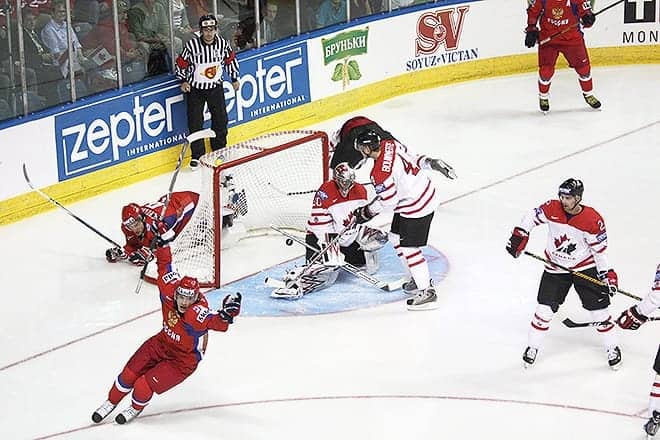Strike in response to racial injustice should include Canadian sports
The Scholar Strike should influence more than just universities
On Sept. 9-10, scholars across Canada participated in a global strike in an act of solidarity with the Black Lives Matter (BLM) movement. These two days on strike were to be used to “pause teaching and administrative duties” and to instead “organize public digital teach-ins on police brutality and violence in our communities from both historical and contemporary perspectives,” according to Scholar Strike Canada’s website.
Also acknowledged on their website is the fact that the movement began thanks to Anthea Butler, the Associate Professor of Religious Studies and Africana Studies at the University of Pennsylvania, and Kevin Gannon, a Professor of History at Grand View University in Des Moines, Iowa.
The two were inspired to start the movement after NBA players went on a brief strike in August, and WNBA players began advocating for racial and social justice.
The Canadian BLM movement advocates against the oppression and violence committed against “all Black communities, including African, Caribbean, Afro-Indigenous, migrant, queer, trans, and disabled Black communities”.
For centuries in Canada, Indigenous people have faced racialized hardships and violence. Indigenous culture has been so deeply wounded by colonialism that many facets of their culture, including sports, has been forever changed,
In 2009, Daniel Alexander Henhawk, an undergraduate student at the University of Waterloo, wrote a thesis entitled “Aboriginal Participation in Sport: Critical Issues of Race, Culture and Power” based on conversations surrounding three generational cohorts in his family. The goal of the project was to analyze and better understand the Indigenous experience within sports in Canada.
“Most of our culture, which was deeply rooted in an environmental ethic, has been destroyed.” Henhawk states, “The details of our historical existence, prior to and after European engagement, are vague, distorted, have been changed completely or lost altogether.”
“What was once a distinctly lived culture is now mostly known only through oral story-telling and the written accounts of European colonists and non-Aboriginal scholars,” he continues. “The change and damage to our indigenous culture has been so brutal and so extensive that for many us ignorance about our history has become the norm.”
In June, during the coronavirus lockdown, CBC Sports and CBC Indigenous released a digital panel discussion entitled “Where do the TRC’s calls for action on Indigenous sports stand?” 2020 marks five years since Canada’s Truth and Reconciliation Commission (TRC) offered recommendations to Canada sports programs to “reduce barriers and become more inclusive of Indigenous athletes” according to CBC.
The panel gathered to discuss how not enough has been done to reach that goal.
The discussion was hosted by CBC’S Duncan McCue and featured various Indigenous Olympic athletes and scholars. Spencer O’Brien of the Haida and Kwakwaka’wakw Nations, Trina Pauls from the Tahltan and Tlingit Nations, and Waneek Horn-Miller from Kahnawake in Quebec – the first Mohawk woman from Canada to make it to the Olympics in 2000 – were in attendance on the panel.
The panel’s scholars included Dr. Lynn Lavallée, an Anishinaabe/Métis instructor at Ryerson University, and Serene Porter, who was the Executive Director of Partnerships and Marketing with the 2021 North American Indigenous Games (NAIG).
“I feel lucky because it is Indigenous based and you get support.” Trina Pauls, a theme who competed in the Arctic Winter Games, stated on the call. “The whole Arctic Winter Games is so inclusive, very diverse, we have people from all over different countries because it’s an international competition.”
“When it comes to the other sports I’ve played, I’ve definitely found a lack of diversity and a lack of support for Indigenous athletes, my age especially.”
The Scholar Strike represents more than a two-day strike by academics. Striking scholars have been arranging, sharing, attending, and hosting digital teach-ins across the country to further discuss and demand action for racial injustices inflicted in our country. This strike is no-longer a call-to-action; it is action, and it’s global action at that.
While we reflect on the strike, it is important for sport institutions in Canada to know that they, too, can take steps to make a positive change in our world. They are not exempt from the discrimination brought to light elsewhere in the world.
The coronavirus pandemic and lockdown is the ideal time to make influential change. We can use this time to emerge from the pandemic with changes set in motion to allow equality in sports in Canada.
Toward the end of his thesis, Henhawk unpacks how colonialism has caused lasting damage that, to this day, causes further discrimination for Indigenous athletes. “Colonialism has taken on many forms. For Aboriginal people, it started with the degrading of our culture with the idea that we were primitive and paganistic with the application of such labels as savage and uncivilized,” he writes.
“Today, colonialism is still at work, legitimizing certain values and perspectives on the purpose and meaning of life, work, religion, and economics and for the purposes of this study, sport. It continues because there are no lived contradictions that define an opposite perspective or viewpoint.”
The Scholar Strike is a statement that calls for larger action and change not just in classrooms, not just in our educational institutions, but everywhere. It calls for change in our homes, schools, cities, families, and sports.
Black Lives Matter and Indigenous Lives Matter are deeply intertwined in our country. They cannot be separated from one another. The Black Lives Canada website expresses their goal clearly: “In our movement for Black liberation, we join calls to decolonize Turtle Island and Nunavut Nunangat.”
“Our struggles are tied up with the struggles of the Indigenous people of the land on which many of our ancestors were brought and forced into brutalization – a living apocalypse. There is no Black Liberation without Indigenous Liberation on Turtle Island.”
https://www.cnn.com/2020/08/27/us/nba-mlb-wnba-strike-sports/index.html
https://www.cnn.com/2020/09/08/opinions/starting-a-scholar-strike-butler-gannon/index.html








